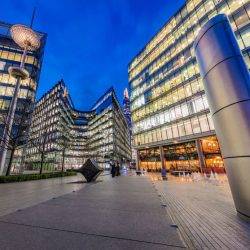July 6, 2018
A storm brewing around the workplace and facilities management
 In Shakespeare’s plays, the sky often goes dark and a storm starts to brew as a prelude to tragedy or violence creating a sense of foreboding. And so it was at today’s BIFM AGM in the lead-up to the special resolution to change the name of the institute from the British Institute of Facilities Management to the Institute of Workplace and Facilities Management. After a fire alarm test appositely kicked off the event, sun poured through the windows and ceiling panes of the Friends Meeting House in Manchester as BIFM chairman Steve Roots gave an update on the institute’s performance in 2017 and plans for 2018. As he introduced the format for the three ordinary resolutions, the sun dipped behind a cloud and the room was plunged into gloom causing murmurs of nervous laughter among the 80-strong audience. (more…)
In Shakespeare’s plays, the sky often goes dark and a storm starts to brew as a prelude to tragedy or violence creating a sense of foreboding. And so it was at today’s BIFM AGM in the lead-up to the special resolution to change the name of the institute from the British Institute of Facilities Management to the Institute of Workplace and Facilities Management. After a fire alarm test appositely kicked off the event, sun poured through the windows and ceiling panes of the Friends Meeting House in Manchester as BIFM chairman Steve Roots gave an update on the institute’s performance in 2017 and plans for 2018. As he introduced the format for the three ordinary resolutions, the sun dipped behind a cloud and the room was plunged into gloom causing murmurs of nervous laughter among the 80-strong audience. (more…)








 The way to measure an employer’s speed of innovation includes how they find talent, their appraisal process, how employees recommend the organisation they work for to others, and how much employees collaborate, claims a new European study by Cornerstone OnDemand and IDC. “Future Culture: Building a Culture of Innovation in the Age of Digital Transformation” explores the relationship between European organisations’ speed of innovation and talent management, with the research showing that firms with a steady stream of new products and services are more likely to have an ongoing feedback process with employees, rather than an annual performance review, while organisations with a slower rate of innovation often use coaching and mentoring to develop employees.
The way to measure an employer’s speed of innovation includes how they find talent, their appraisal process, how employees recommend the organisation they work for to others, and how much employees collaborate, claims a new European study by Cornerstone OnDemand and IDC. “Future Culture: Building a Culture of Innovation in the Age of Digital Transformation” explores the relationship between European organisations’ speed of innovation and talent management, with the research showing that firms with a steady stream of new products and services are more likely to have an ongoing feedback process with employees, rather than an annual performance review, while organisations with a slower rate of innovation often use coaching and mentoring to develop employees.
 There is a critical need for to simplify the regulatory framework designed to improve energy efficiency in commercial buildings finds a recent report from the Environmental Industries Commission (EIC) Carbon Management & Sustainable Buildings Working Group. It also suggests that Brexit could act as a spur to rethink the right combination of policies to reform enforcement systems. The report, Improving non-domestic energy efficiency after Brexit, one of a series EIC is publishing setting out its members’ views on the impact of Brexit on environmental policy and how policy should evolve after the UK leaves the EU, covers the breadth of energy efficiency policy for non-domestic buildings. As part of its research, EIC surveyed England’s local authorities, who have responsibility for trading standards, finding that out of those that responded (122 out of 149), no local authorities have been issuing fines for failing to display Energy Performance Certificates or Display Energy Certificates.
There is a critical need for to simplify the regulatory framework designed to improve energy efficiency in commercial buildings finds a recent report from the Environmental Industries Commission (EIC) Carbon Management & Sustainable Buildings Working Group. It also suggests that Brexit could act as a spur to rethink the right combination of policies to reform enforcement systems. The report, Improving non-domestic energy efficiency after Brexit, one of a series EIC is publishing setting out its members’ views on the impact of Brexit on environmental policy and how policy should evolve after the UK leaves the EU, covers the breadth of energy efficiency policy for non-domestic buildings. As part of its research, EIC surveyed England’s local authorities, who have responsibility for trading standards, finding that out of those that responded (122 out of 149), no local authorities have been issuing fines for failing to display Energy Performance Certificates or Display Energy Certificates.


 Business Secretary Greg Clark proposed new laws in Parliament yesterday (June 11th) that new large firms will have to justify their chief executives’ salaries and reveal the gap to their average UK worker. It means that for the first time, UK listed companies with more than 250 UK employees will have to disclose and explain this difference – known as ‘pay ratios’ – every year. However, according to data published today by the Chartered Management Institute (CMI) and
Business Secretary Greg Clark proposed new laws in Parliament yesterday (June 11th) that new large firms will have to justify their chief executives’ salaries and reveal the gap to their average UK worker. It means that for the first time, UK listed companies with more than 250 UK employees will have to disclose and explain this difference – known as ‘pay ratios’ – every year. However, according to data published today by the Chartered Management Institute (CMI) and 

















July 23, 2018
New report on the future of work argues we are at an inflection point on the journey
by Mark Eltringham • Comment, Technology, Workplace design
(more…)